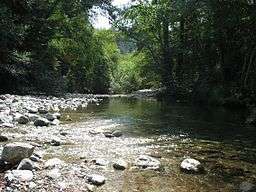Big Sur River
| Big Sur River | |
| River | |
 Big Sur River as it passes the campgrounds | |
| Country | |
|---|---|
| State | California |
| Region | California Central Coast |
| County | Monterey County |
| Tributaries | |
| - left | Ventana Creek, Lion Creek, Cienaga Creek |
| - right | Post Creek, Terrace Creek, Logwood Creek, Delores Creek, Mocho Creek |
| Mouth | Pacific ocean |
| - elevation | 0 ft (0 m) |
| - coordinates | 36°16′49.87″N 121°51′35.84″W / 36.2805194°N 121.8599556°WCoordinates: 36°16′49.87″N 121°51′35.84″W / 36.2805194°N 121.8599556°W |
| Length | 15.7 mi (25 km) |
The Big Sur River is a 15.7-mile-long (25.3 km)[1] river on the Central Coast of California. The river drains a portion of the Big Sur area, a thinly settled region of the Central California coast where the Santa Lucia Mountains rise abruptly from the Pacific Ocean. The Big Sur River's headwaters are in the mountains, it flows roughly northwest and empties into the ocean, where there is a natural sandbar that has created a lagoon. Major Tributaries of the river include, in order: Redwood Creek, Lion Creek, Logwood Creek, Terrace Creek, Ventana Creek, Post Creek, Pfeiffer-Redwood Creek, Juan Higuera Creek, and Pheneger Creek.[2]
Most of the river's 60-square-mile (160 km2) watershed is in the Ventana Wilderness of the Los Padres National Forest. Precipitation increases with altitude at Big Sur and the higher elevations can receive over 50 inches (1,300 mm) per year, about 10 inches (250 mm) higher than lower areas. The average yearly runoff on the river is 65,000 acre feet (80,000,000 m3). It is the largest river by volume on the Big Sur coast. There are some diversions on the river and its tributaries for drinking water to supply nearby homes and resorts, but no major dams or reservoirs.
Vegetation
The vegetation of the watershed is diverse. Along the main river canyon and many side tributaries grow riparian species such as California Sycamore and White Alder. Extensive stands of old-growth Redwood trees tower above moist canyons and north-facing slopes below approx. 2400 ft. Above the redwoods, a mixed-hardwood forest of Madrone, Tanoak, Coast Live Oak, Canyon Oak, and occasionally Ponderosa and Coulter Pine predominates. The rare Santa Lucia Fir, endemic to the Santa Lucia Mountains, is found scattered in small groves, including one near the confluence of the Big Sur River and Ventana Creek, the lowest elevation (600 feet) known in the wild. On higher, steep, and South-facing slopes the chaparral is found, a scrub community often dominated by Chamise and Manzanita. Grassland and open Pine Forest are found on a few ridgetops.
Recreation
A popular 26-mile hiking trail, the Pine Ridge Trail, follows the Big Sur River for several miles inland. Several backcountry camps are located along the river, including Ventana Camp, Barlow Flat Camp, and Sykes Camp. Near Sykes Camp, approximately 10 miles inland by trail, there is a popular Hot Springs above the riverbank. From there, the trail crosses the river, and 3 miles later reaches Redwood Camp, situated along the tributary Redwood Creek. From here, the trail climbs over 3,000 vertical feet to Pine Ridge, and enters the Carmel River watershed, eventually exiting the wilderness at China Camp.
Big Sur Policies
In 1986 the Big Sur Local Coastal Plan (LCP) was certified in order to begin the implementation of the 1972 federal Coastal Zone Management Act (CZMA). The California Coastal Commission implemented the LCP in order to provide a detailed policy guidance to allow for a more balanced system whereby the development needs of the area (of the home owners and the local community) was met, whilst taking into consideration the local resources and their protection.[3]
Along with the LCP, previous acts had already been implement to protect the natural ecosystems. In 1968 the Wild River and Scenic Act aimed at preserving free-flowing conditions (uninhibited by dams etc.) of particular rivers within the United States. The conservation of these rivers was the need to protect them for present and future generations for their “outstandingly remarkable values.”[4]
See also
References
- ↑ U.S. Geological Survey. National Hydrography Dataset high-resolution flowline data. The National Map Archived 2012-04-05 at WebCite, accessed March 15, 2011
- ↑ U.S. Geological Survey Geographic Names Information System: Big Sur River
- ↑ "Welcome to the Big Sur Watershed". Welcome to the Big Sur Watershed. Retrieved 15 May 2015.
- ↑ "Big Sur Watershed". American Whitewater. Retrieved 15 May 2015.